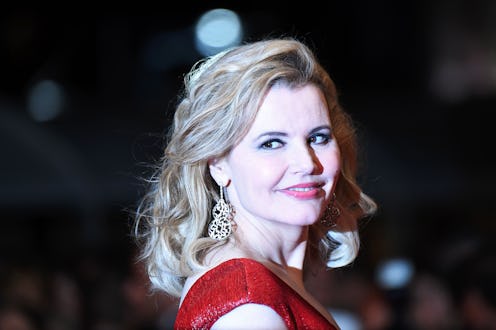Entertainment
The Geena Davis Institute Is Working
Geena Davis is back on television in FOX’s new series The Exorcist. Davis has been active in fighting for more opportunities for women in Hollywood, both in the stories they tell and the people who make them. She created The Geena Davis Institute on Gender in Media to promote more female characters in film and television, and more women working behind the scenes. In 2013, Davis wrote an editorial in The Hollywood Reporter’s Women in Entertainment Power 100 issue suggesting that screenwriters change several characters in their scripts to women, and specify that crowd scenes are made up of 50% women. Not a bad suggestion, at all.
In the three years since that article, the Geena Davis Institute has gathered statistics on the impact of her suggestion. The good news is that more than half of screenwriters who read her article took her advice. “We actually did a survey, my institute, we did a survey of everybody who’s heard our presentation in the business and 68% said it had changed two or more of their projects,” Davis told reporters at a reception for The Exorcist. “41% said it had changed four or more of their projects. That includes things like switching male to female characters, adding more female characters, giving them better occupations, more to say, putting more clothes on them. Various things like that.”
Now that Davis has gotten writers thinking about how many women they include in their screenplays, I asked her what further steps we should take to make movies more diverse.
“It has to be in front of everybody’s mind when they’re creating projects because it really is something that can happen so quickly and easily,” Davis says. “If you just stop before you cast something and think about it, [you can have] a very diverse and gender balanced script very easily. Our focus now is making sure there’s no more missed opportunities where a kids movie comes out and it’s very imbalanced gender-wise when it so easily could have been balanced. Let’s think about it before it happens. It’s also unconscious. All of us have sort of unconscious gender bias that we’ve gotten from the media that we’ve consumed. But I’m very optimistic.”
Kids movies may be making improvements for females in film. Frozen features two female leads, and Finding Dory, a sequel, made its female supporting character the star. Davis starred in the family films Stuart Little and Stuart Little 2 in which she played a mom who adopts a mouse, voiced by Michael J. Fox. Even between the original and the sequel, she made suggestions to include more female characters.
“After we did Stuart Little, I talked a lot about let’s make things more gender balanced,” Davis says. “So we added a female bird character, we added a female baby.”
And of course, Davis starred in some of the biggest female-led hits of the ‘90s. Films like Thelma & Louise and A League of Their Own were summer blockbusters. Since then, hits like Kill Bill, The Hunger Games, and Spy keep proving women can open big Hollywood movies. Yet, it is still a fight for filmmakers to pitch female-centric movies. Davis says that, unfortunately, Hollywood is still unwilling to recognize decades’ worth of hits.
“We haven’t been able to have any momentum created despite all these successes,” Davis says. “I think it’s simply because for so long, Hollywood has operated under the assumption that women will watch men but men don’t want to watch women. So every movie that’s successful with women is still [seen as] ‘Well, maybe that was a one-off.’ They don’t dare realize there’s a huge interest in movies about women, starring women and directed by women. You hope something like Star Wars where the lead character is female will [impact them].”
But even The Force Awakens' Rey, who is beloved by many, showcased some problems, as Disney momentarily forgot to make toys of the main character in the movie. The same thing happened with Black Widow in The Avengers. But Davis is encouraged that these issues are being addressed and rectified.
“Steps, steps,” she says. “We’ll get there.”
One franchise that took major steps for diversity is Spy director Paul Feig’s Ghostbusters, which cast four women as the new ghostbusters. This has been met with a year’s worth of male fans criticizing the choice before the film is even out. It seems even if filmmakers take Davis’s advice, they must weather a backlash from some fans resistant to change. Davis, however, was not worried that the Ghostbusters backlash represents any real resistance. She suspects it is a small but vocal minority.
“I think a lot of it is sort of internet trolls,” Davis says. “I really have a feeling it’s going to be a big hit and a big success. The guys that were in the first one and responsible for the first one are totally behind it and love it. So I think it’s one of those things that once it is out and happens, everybody will be like, ‘What was the big deal?’”
To me, all it means is that, while things are improving, there is still a lot of work to be done. Davis feels the widespread acceptance of gender diversity will come from more than just Hollywood, but from women succeeding in politics too.
“There is still a lot of work to be done,” Davis says. “It has to become just absolutely common that films are gender balanced or starring a female character. We have to not only have the first female president, we have to have it equally likely that it will be a woman whenever there is an election.”
You can see Davis in The Exorcist when it premieres September 23 on FOX.
Images: Frank Micelotta, Chuck Hodes/FOX
